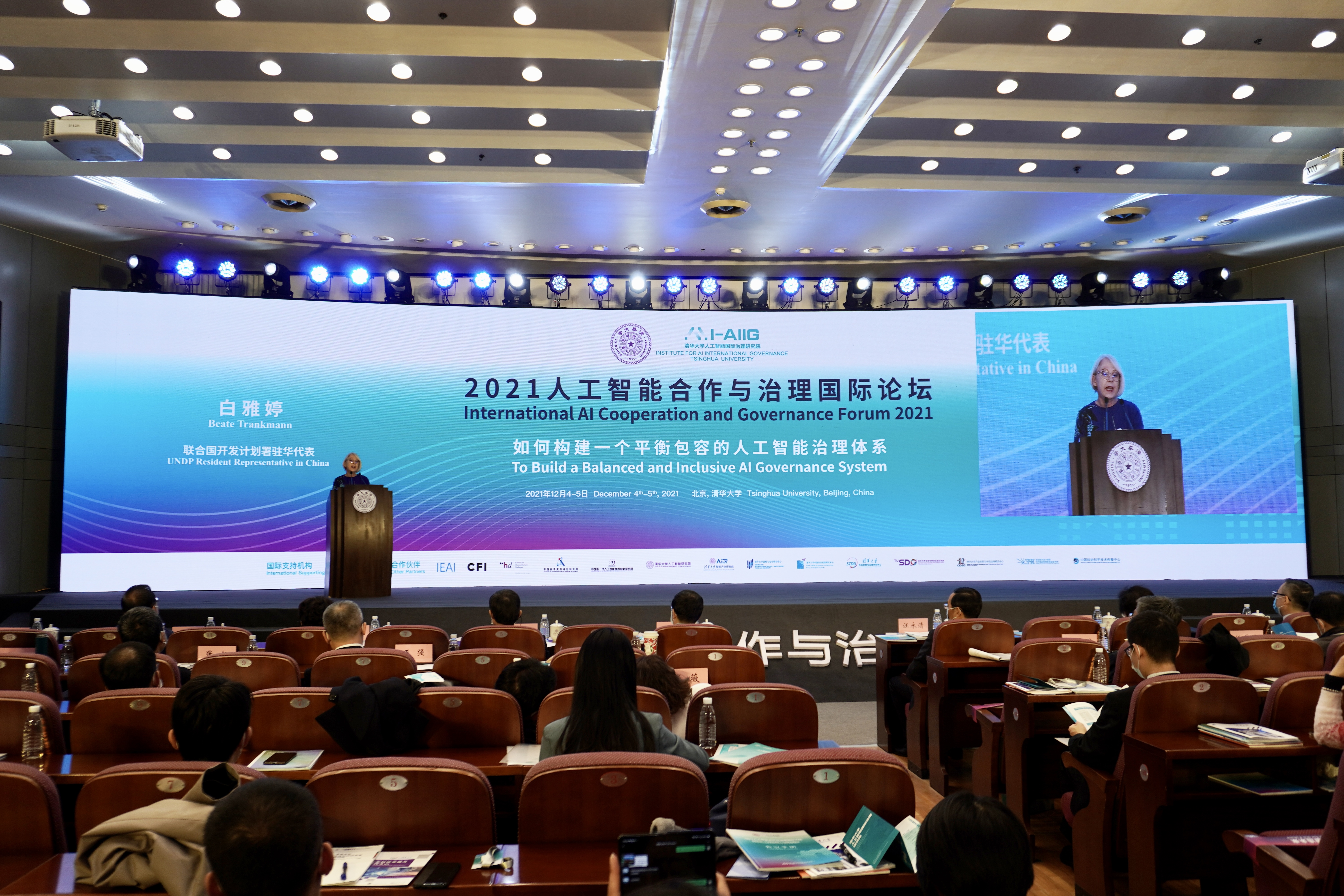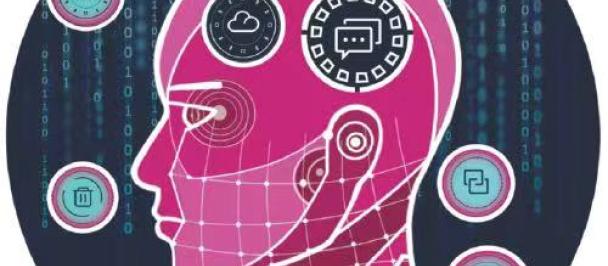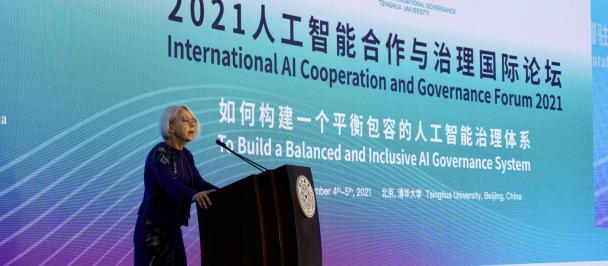UNDP Resident Representative in China Beate Trankmann delivers opening remarks at the 2021 Tsinghua University International AI Cooperation and Governance Forum
6 December, Beijing – A multilateral and multistakeholder global platform is needed to build a balanced and inclusive AI governance system, agreed world-leading experts at the 2021 Tsinghua AI International Cooperation and Governance Forum, which concluded yesterday.
Hosted by Tsinghua University, and with UNDP as the international supporting partner, the two-day forum convened thought leaders and practitioners from across the world, including top officials from government and international organizations, prominent academics, and executives from the tech sector.
Though AI presents myriad opportunities and is increasingly integrated into our everyday lives, it also poses risks and governance challenges which remain to be addressed. This year’s forum advanced the global conversation around the equitable use of AI, examined AI’s role in international cooperation and sustainable development, and discussed building global policy frameworks around fast emerging technologies such as the Metaverse.
Qiu Yong, president of Tsinghua University emphasized the role of universities in advancing AI governance. “As an important source of scientific advancement, universities don’t only strive for theoretical and technological breakthroughs of AI, we also adhere to the principle of ‘AI for good’ and seek to build an AI global governance system that is both scientific and well-grounded,” he said.
Inclusive AI governance is in line with United Nations Secretary-General’s Roadmap for Digital Cooperation, of which the objective is to ‘bring together all stakeholders to build a more open, free, and secure digital future for all.’ Maria-Francesca Spatolisano officer in charge of the office of the United Nations Secretary-General’s Envoy on Technology emphasized this point saying, “it is through our collective efforts that we can promote artificial intelligence that is trustworthy, human rights based, safe and sustainable, and promotes peace.”
“I applaud the idea of building an international mechanism of cooperation within the UN system, in order to pool ideas from people from all countries, different fields of study and all walks of life, so that we may move swiftly forward in AI global cooperation and governance through shared consultation,” said Xue Lan, dean of the Institute for AI International Governance of Tsinghua University (I-AIIG).
Haoliang Xu, United Nations Assistant Secretary-General and Director of Bureau for Policy and Programme Support of UNDP drew attention to the societal risks posed by AI, algorithms and their inherent biases, calling for multi-stakeholder cooperation to ensure that AI applications are co-governed and inclusive. “AI is not a silver bullet. It is only as good as the humans that deploy it, the data on which it is based, and the standards that govern its use.”
The forum included multiple panel discussions on a wide range of topics related to AI governance. During the forum’s first day, UNDP helped lead sessions on bridging the divide between countries in the development and use of AI technologies, leveraging AI to accelerate climate action, and tackling algorithmic bias for social justice.
In the panel on closing the divide in AI capabilities between countries, panelists agreed on the need for greater representation from developing countries. The UN was highlighted as a critically important international institution to lead and facilitate a multilateral and multistakeholder approach to creating an inclusive AI governance framework
The AI and climate action panel looked at how AI applications have immense potential to address climate-related challenges, both in terms of mitigation and adaptation. While panelists discussed the use of AI to measure and curb carbon emissions, they also elaborated on the climate impact of AI technologies themselves, such as through massive energy consumption of data-centers and the exacerbation of environmental exploitation.
During the panel on AI and social justice, discussion revolved around the societal challenges posed by AI algorithms, including the risk of introducing digital discrimination based on gender, ethnicity and other social groups. The panel explored opportunities for interdisciplinary collaboration and ways to address and manage biases and exclusion so that AI applications can benefit everyone in line with the Sustainable Development Goals.
The second day of the forum transitioned to looking at the future frontiers of AI to aid policymakers in preparing for future challenges.
In particular, UNDP led a panel looking at the future of AI governance in the Metaverse, and the implications of a virtual world on the relationships between both countries and individuals. Panelists touched on a variety of issues brought on by the integration of digital technologies in the Metaverse that redefine power, rights, and relations in a virtual space, and consequently reconstruct societal structures and orders in the real world. A key topic was how to ensure such cutting-edge technologies do not further widen existing digital divides and exacerbate inequalities.
With AI technologies presenting such diverse challenges and multiple areas of potential socio-economic disruption, Beate Trankmann, Resident Representative, UNDP China reflected that “to keep up with the rapid pace of innovation at the forefronts of technology, policy makers must be forward-looking. We can’t simply address the problems of today but must also anticipate the challenges of tomorrow.” She added, “if we do not, we will always be one step behind.”
***
For more information on the Tsinghua University International AI Cooperation and Governance Forum 2021, please visit:
https://www.tsinghuaaiforum.org
For more information or to request an interview, please contact:
Ms. PuNa ZHAO Yue, Innovation and Communications Officer, UNDP China
Yue.zhao@undp.org | +86-10-85320797

 Locations
Locations

